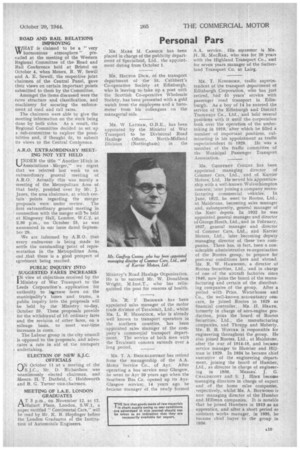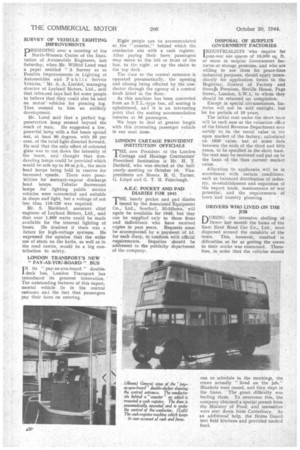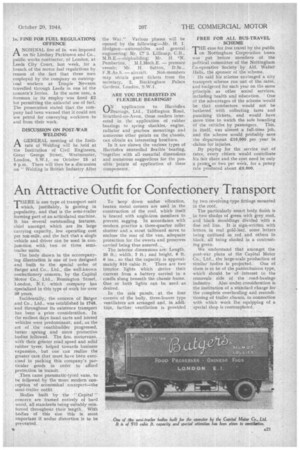ROAD AND RAIL RELATIONS IMPROVING VUHAT is claimed to be
Page 21

Page 22

Page 23

If you've noticed an error in this article please click here to report it so we can fix it.
a "very W harmonious atmospheres prevailed at the meeting of the Western Regional Committee of the Road and Rail Conference held at Bristol on October 4, when Messrs. R. W. Sewill and A. E. Sewell, the respective joint chairmen of the Central Panel, gave their views on certain important points submitted to them by the Committee.
Amongst the items discussed were the rates structure and. classification, and machinery for securing the enforcement of road and rail rates.
The chairmen were able to give the meeting information on the work being done by both sides. As a result, the Regional Committee decided to set up a sub-committee to explore the possibilities and, if thought fit, to submit its views to the Central Conference.
A.R.O. EXTRAORDINARY MEETING NOT YET HELD
UNDER the title " Another IIitch in Associations • Merger," we regret that we referred last week to an extraordinary general meeting of A.R.O. • Actually this was merely a meeting of the Metropolitan Area of that body, presided over by Mr. J. Janes, the area chairman, at which certain points regarding the merger proposals were under review. The first extraordinary general meetincin connection with the merger will be held at Kingsway Hall, London, W.C.2, at 2.30 p.m., on October 25, as was announced in our issue dated September 29.
We are informed by A.R.O. that every endeavour is being made to settle the outstanding point of representation in the Metropolitan Area, end .that there is a g6od prospect of agreement being reached. .
PUBLIC INQUIRY INTO
SUGGESTED FAR ES INCR E ASES I N view of objections received by the Ministry of War. Transport to the Leeds Corporation's application for authority to iacrease fares on the municipality's buses and trams, a public inquiry into the proposals will be held by the Ministry to-day, October 20. These proposals provide for the withdrawal of id. ordinary fares and the revision of other fares, on a mileage basis, to meet war-time increases in costs.
The Labour group in the city council is opposed to the proposals, and advocates a rate in aid of the transport undertaking.
ELECTION OF NEW S.J.C. OFFICIALS
ON October 11 at a meeting of the S.J.C., Mr. D. Richardson was unanimously elected chairman, and Messrs. H. T. Dutfield, C. Holdsworth and B. G. Turner vice-Chairmen.
MEETING OF I.A.E. LONDON GRADUATES
AT 3 p.m., on November 12, at 12, Hobart Place, London, S.W.1, a paper entitled " Continental Cars," will be read by Mr. K. B. Hopfinger before the London Graduates of the Institution of Automobile Engineers. MR. MARK M. CANSTCK has been placed in charge of the publicity department of Specialloid, Ltd., the appointment dating from October 1.
MR. HECTOR Dicx, of the transport department of the St. Cuthbert's Co-operative Society at Edinburgh, -who is leaving to take up a post with the Scottish Co-operative Wholesale Society, has been presented with a gold watch from the employees and a barometer from his colleagues on the managerial side.
MR. W LATHAM, 0.B.E., has been appointed by the Minister of War Transport to be Divisional Road
Haula ge Officer, • North-Midland Division (Nottingham) in the Ministry's Road Haulage Organization. He is to succeed Mr, W. Donaldson Wright, M.Inst.T., who has relinquished the post for reasons of health.
MR. '12. F. BROOKER has been appointed sales manager of the motor trade division of Tecalemit, Ltd., whilst MR. L. R, HEDGCOCK, who is already well known to transport operators in the southern counties, has been ,appointed sales nianager of the company's commercial transport department. The service of both men with the Tecalemit concern extends over a long period.
MR. T. A. BROCKLEHURST has retired from the managership of the A.A. Motor Service Co., of Ayr. After operating a bus service near Glasgow, he went to Ayr 20 years ago when the Southern Bus Co. opened up its AyrGlasgow service; 14 years ago he became manager of the newly formed A.A. service. His successor is MR. H. M. MacRaa, who was for 20 years with the Highland Transport Co., and for seven years manager of the Sutherland Transport Co. at Lairg.
MR. T. KINGHORN, traffic superintendent of the transport department of Edinburgh Corporation, who has just retired, had 51 years' service with passenger road transport in Edinburgh. As a boy of 14 he entered the service of the Edinburgh and District Tramways Co., Ltd., and held several positions with it until the corporation took over the operation of the undertaking in 1919, after which he filled a number of important positions, culminating in his appointment as traffic
superintendent in 1929. He was a member of the traffic committee of the Municipal Passenger Transport Association.
MR. GEOFFREY COZENS has been appointed managing director of Cornmer Cars, Ltd., and of Karrier Motors', Ltd. He served his apprenticeship with a well-known Wolverhampton concern later joining a company_manufacturing commercial vehicles. In June, 1922, he went to Rootes, Ltd., at Maidstone, becoming sales manager and, subsequently, general manager of the Kent depots. In 1932 he was appointed general manager and director of George Heath, Ltd., and in February, 1937, general manager and director of Commer Cars, Ltd_ and Karrier Motors, Ltd., later becoming deputy managing director of these two companies. There has, in fact, been a considerable administrative re-organization of the Rootes group, to prepare for post-war conditions here and abroad. Ma. R. W. HAMMOND, a director of Rootes Securities, Ltd., and in charge of one of the aircraft factories since 1940, now joins the board of the manufacturing and certain of the distributing companies of the group. After a period with Price, Waterhouse and Co., the well-known accountancy concern, he joined Routes in 1929 as financial controller. MR, .H. HEATH, formerly in charge of aero-engine production, joins the board of Rootes Securities, Ltd., the manufacturing companies, and Thrupp and Moberly. Ma. B. B. WINTER is responsible for engineering throughout the group. He also joined Rootes, Ltd., at Maidstone, after the war of 1914-18, and became service manager to Humber and Hillman in 1929. In 1934 he became chief executive of the engineering department, joining the board of Humber. Ltd., as director in charge of engineering in 1938. MESSRS.. J. G. CHALDECOTT and S. J. HINE become managing directors in charge of export and of the home sales companies, respectively, whilst MR. A. BOTWOOD is now managing director of the Humber and Hillman companies. It is notable that he joined Hnmbers in 1913 as an apprentice, and after a short period as assistant works manager, in 1935, he became chief buyer to the group in 1936.
SURVEY OF VEHICLE LIGHTING IMPROVEMENTS DRESIDING over a meeting of the
North-Western Centre of the Institution of Automobile Engineers, last Saturday, when Mr. Wilfrid Lund read a paper entitled " A Survey as to Possible improvements in Lighting of Automobiles and Public Service Vehicles," Mr. A. A. Liard.et, managing director of Leyland Motors, Ltd., said that infra-red rays had Ted some people to believe that they could also be used on motor vehicles for piercing fog. That seemed to him an unlikely development.
Mr. Lund said that a perfect fogpenetration lamp seemed beyond the reach of man. He suggested a low, powerful lamp with a flat beam spread out, at least 90 degrees, with 50 per cent. of the total light directed forward. He said that the only effect of coloured glass was to cut down the intensity of the beam, and thought that nondazzling lamps could be provided which would he safe up to 50 m.p.h.., the main head lamps being held in reserve for increased speeds. There were possibilities for mercury-vapour discharge head lamps. Tubular fluorescent lamps for lighting public service vehicles were economical and suitable in shape and light, but a voltage of not less than 110-120 was required.
Mr. S. Markla.nd, assistant chief engineer of Leyland Motors, Ltd., said that over 1,000 watts could be made available for the internal lighting of buses. He doubted if there was a future for high-voltage systems. He expressed the opinion that the wider use of studs on the kerbs, as well as in the road centre, would be a big contribution to safety.
LONDON TRANSPORT'S NEW " PAY-AS-YOU-BOARD " BUS I N its " pay-as-you-board " double deck bus, London Transport has introduced its greatest innovation. The outstanding features of this experimental vehicle lie in the central entranct and the fact that passengers pay their fares on entering. Eight people can be accommodated at the " counter," behind which the conductor sits with a cash register. After paying their fares passengers may move to the left or front of the bus, to the nght or up the stairs to the top deck The r:oor to the central entrance is operated pneumatically, the opening and closing being effected by the conductor through the agency of a control knob fitted in the floor.
As this machine has been converted from an S.T.L.-type bus, all seating is upholstered, and it is an interesting point that the seating accommodation remains at 56 passengers.
We hope to deal at greater length with this interesting passenger vehicle in our next issue.
LONDON CARTAGE PROVIDENT INSTITUTION OFFICIALS
THE new President of the London
HE and Haulage Contractors' Provident Institution is Mr. H. T. Duffield, who was elected at the halfyearly -meeting on October 10. Vicepresidents are Messrs. B'. G. Turner, G. Lloyd and G. T. M. Fairclaugh.
A.E.C. POCKET AND PAD DIARIES FOR 1945 THE handy pocket and pad diaries issued hy the Associated Equipment Co., Ltd.._ Southall, Middlesex, will again be available for 1945, but they can be supplied only to those firms and individuals who have received copies in past years. Requests twist be accompanied by a payment of Id. for each diary, to conform with official requirements. Inquiries should be addressed to the publicity department of the company. DISPOSAL OF SURPLUS GOVERNMENT FACTORIES
I NDUSTRIALISTS who require for post-war use spaces of 10,000 sq_ ft. or more in surplus Government factories or storage premises, and who are willing to use them for peace-time industrial purposes, should apply immediately for application forms to the Registrar, Control of Factory and Storage Premises, Neville House, Page Street, London, S.W.1, to whom they should be returned on completion.
Except in special circumstances, factories will not be sold outright, but let for periods of 10 years.
The initial rent under the short lease will be such sum as the valuation office of the Inland Revenue Department may certify to be the rental value in the open market of the factory, calculated on 1939 value, but at some date between the ends of the third and fifth years, to be specified in the short lease, the rent may be reviewed and put on to the basis of the then current market value.
Allocation to applicants will be itt accordance with certain conditions, such as balanced distribution of industry, re-establishment and expansion of the export trade, maintenance of war potential, and the requirements of town and country planning, DRIVERS WHO LIVED ON THE JOB
DURING the intensive shelling of Dover last month the buses of the East Kent Road Car Co., Ltd., were dispersed around the outskirts of the town. This, however,, resulted in difficulties so far as getting the crews to their works was concerned. Therefore, in order that the vehicles should run to schedule in the mornings, the crews actually "lived on the job." Blankets were issued, and they slept in the buses. The great difaculty WAS feeding them. To overcome this, the company obtained a special permit from the Ministry of Food, and necessities were sent down from Canterbury. As an additional help, the Home Guard lent field kitchens and provided cooked food.
Is. FINE FOR FUEL REGULATIONS OFFENCE
ANOMINAL fine of is. was imposed on Sir Lindsay Parkinson and Co., public works contractor, of London, at Leeds City Court, last week, for a breach of the motor fuel regulations by reason of the fact that three men employed by the company as outcropcoal workers at Temple Newsam travelled through Leeds in one 'of the concern's lorries. In-the same case, a foreman in its employ was fined £2 for permitting the unlawful use of fuel. The prosecution stated that the company had been warned that it could not use petrol for conveying workmen .to and from their work.
DISCUSSION ON POST-WAR WELDING
A GENERAL meeting of the Institute of Welding will be held at the Institution of Civil Engineers, Great George Street, Westminster, London, S.W.1, on October 25 at 6 p.m. There will then be a discussion on " Welding in British Industry After the War." Various phases will be opened. by the following:—Mr. H. I. Hodgson—automobiles and general engineering; Mr. Cl` S. Lillicsap, CE., M.B.E.—shipbuilding; Mr. H. N.
Pemberton, M.I.Mech.E. — pressure vessels; Mr. H. Sutton, D.Sc.,
F.R.Ae.S. — aircraft. Non-members may obtain guest tickets from the secretary, 2, Buckingham Palace Gardens, London, S.W.!.
ARE YOU INTERESTED IN FLEXIBLE BEARINGS?
ON application to Harrisflex sBearings, Ltd., Tiddington Road, Stratford-on-Avon, those readers interested in the application of rubber bearings to spring shackles, • engine, radiator and gearbox mountings and numerous other points on the chassis, can obtain an interesting brochure.
In it are shown the various types of Harrisflex controlled flexible ' bearing, 'together with all essential dimensions and numerous suggestions for the possible -joints of application of these components. FREE FOR ALL BUS-TRAVEL SCHEME
THE rase for free travel by the public on Nottingham Corporation buses was " put before members of the political committee of the Nottingham Co-operative Society by Aid, Walter Halls, the sponsor of the scheme.
• He said his scheme envisaged a city transport scheme run out of the rates, and budgeted for each year on the same principle as other social services, including health and education. One of the advantages of the scheme would be that conductors would not be bothered with collecting fares and punching tickets, and would have more time to watch the safe boarding
of the vehicles by passengers. This, in itself, was almost a full-time job, and the scheme would probably save the department £10,000 per year in claims for injuries.
I3y paying for the seivice out of rates, every citizen would contribute his fair share and the cost need be only a pennywor two per week, for a penny rate produced about £9,000.




















































